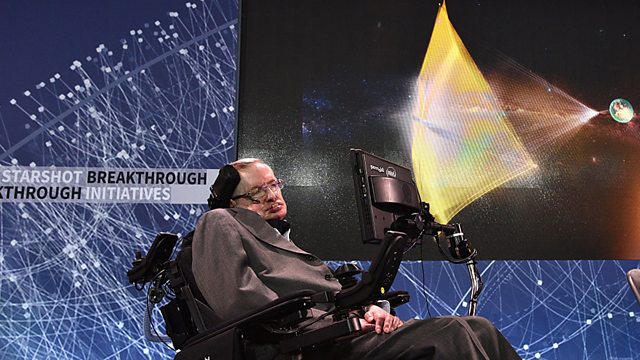
Stephen Hawking’s Tiny Spaceship
Steven Hawking and space travel; Zika and pregnancy; Yellow Fever outbreak; Travelling to the moon; Butterfly navigation; Reviving the rhino horn trade
Stephen Hawking is backing a project to send tiny spacecraft to another star system within a generation. A $100m (£70m) research programme to develop the computer chip-sized "starships" has been launched by the billionaire Yuri Milner, supported by Facebook founder Mark Zuckerberg.
Zika and Pregnancy
We look at new research that shows the Zika virus can significantly damage the developing brain. Researchers found small samples of human brain tissue infected with the Zika virus died within days, while 40% of more mature brain models showed reduced growth. And related work shows the Zika virus can affect many different stage of embryonic brain development.
Yellow Fever Outbreak in Angola Worsens Vaccine Shortage
The outbreak of yellow fever in the African state of Angola – where 242 people have died - has now spread to neighbouring Democratic Republic of Congo. There is an effective vaccine that prevents yellow fever and a huge vaccination programme in Angola has already inoculated six million people. With just four facilities in the world producing the vaccine we ask whether supply can keep up with demand.
Return to the Moon
Space travel is expensive. Scientists and engineers met recently to discuss a way of making it cheaper. Sending men back to the moon to mine it may sound like a hugely costly process, but as reporter Roland Pease discovers, when it comes to future space missions, especially those aimed at reaching distant planets, it might become an essential part of the process.
Penguincam
How can you keep tabs on thousands of penguins when they live in one of the remotest places on Earth? Victoria Gill has been to Antarctica to look at how scientists use a network of cameras to study penguins all year round.
Great Monarch Butterfly Migration Mystery Solved
Monarch butterflies migrate from Canada to Mexico. They are the only insects to migrate such a vast distance. A team of biologists and mathematicians have recreated the internal compass the butterflies use to navigate on that journey. They say this mechanism, which is linked to the position of the sun, could have applications for human navigation and even replace GPS.
Selling Rhino Horn
Should Rhino horn be sold to help protect rhinos from poaching? This is a live issue in South Africa where poaching has increased massively since a ban on the sale of rhino horn was introduced in 2009. Adam Hart, looks at the pros and cons, he meets rhino breeders who would like to use money earned from horn sales to fund conservation and protection of rhinos. Others worry such a move would increase demand for horn and not reduce poaching.
(Photo caption: Stephen Hawking at a press conference to announce Breakthrough Starshot, a new space exploration initiative © Bryan Bedder/Getty Images for Breakthrough Prize Foundation)
The Science Hour was presented by Jack Stewart with comments from ���˿��� News science reporter Victoria Gill
Producer: Julian Siddle
Last on
Broadcasts
- Sat 16 Apr 2016 08:06GMT���˿��� World Service Australasia
 Sat 16 Apr 2016 19:06GMT���˿��� World Service ANR
Sat 16 Apr 2016 19:06GMT���˿��� World Service ANR Sat 16 Apr 2016 22:06GMT���˿��� World Service Core, ���˿��� World Service ANR, ���˿��� World Service US Public Radio & ���˿��� World Service
Sat 16 Apr 2016 22:06GMT���˿��� World Service Core, ���˿��� World Service ANR, ���˿��� World Service US Public Radio & ���˿��� World Service- Sun 17 Apr 2016 01:06GMT���˿��� World Service Australasia
 Sun 17 Apr 2016 03:06GMT���˿��� World Service ANR
Sun 17 Apr 2016 03:06GMT���˿��� World Service ANR- Sun 17 Apr 2016 11:06GMT���˿��� World Service & ���˿��� World Service Core
 Sun 17 Apr 2016 13:06GMT���˿��� World Service US Public Radio
Sun 17 Apr 2016 13:06GMT���˿��� World Service US Public Radio- Sun 17 Apr 2016 16:06GMT���˿��� World Service News Internet
 Mon 18 Apr 2016 01:06GMT���˿��� World Service US Public Radio
Mon 18 Apr 2016 01:06GMT���˿��� World Service US Public Radio- Mon 18 Apr 2016 05:06GMT���˿��� World Service South Asia
Podcast
-
![]()
Unexpected Elements
The news you know, the science you don't

